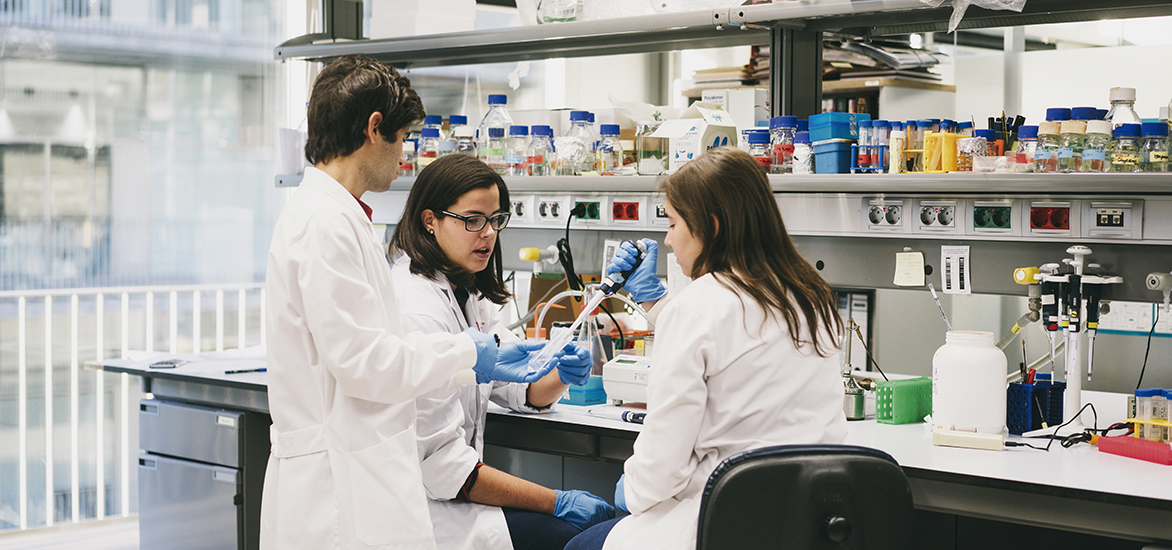Research
«A research university committed to facilitating social transformation.»

UPF has become a research-intensive university. Its academic community, as a whole, is oriented towards producing excellent, competitive and internationally recognized research and towards establishing a reputation for seriousness and scientific relevance. As a result, it has a proven capacity – rather unique in the context of our immediate environment – to secure competitive funding for projects. However, whilst UPF is a leading university in Spain and has a high level of scientific output in relative terms, its inter- national leadership and visibility are limited, probably due to factors such as the reduced weight of its research output in absolute terms or its still limited collaboration with the industry and the service sectors.
The university has been successful at attracting international talent – through programmes such as ICREA – and at securing funds in competitive grant programmes sponsored by the EU. Nevertheless, the attraction of talent is hindered by regulatory rigidity and funding difficulties. Therefore, to continue to make strides in this area, it is essential to implement a proactive recruitment policy.
The various research institutions that belong to the UPF group, which maintain a very close relationship with the university, are also an asset of the first order in this regard, as they broaden our reach, contribute to excellence and internationalization, and promote synergies, thereby allowing us to consider more ambitious growth strategies and policies.
The challenge of better integrating teaching and research calls for a new educational model, one that narrows the gap between students and research, innovation and knowledge transfer, as proposed in the strategic area devoted to teaching. In addition to this challenge, it is also necessary to promote innovation and knowledge transfer to connect the research carried out at the university with the business world and, more broadly, with industry and the service sector.
«A research culture open to the transfer of results and sensitive to their social impact, guided by the principles of responsible research and innovation.»
Research strategies
To consolidate research as one of UPF’s defining traits:
Implementing a proactive policy for recruiting and retaining international talent that includes more flexible and suitable hiring tools with well-defined, internationally comparable criteria. This policy should be based on best practices with regard to academic careers and promotion, and must offer researchers both freedom and confidence and long-term prospects.
Encouraging the research community’s commitment to knowledge transfer and social entrepreneurship. Foster a research culture that is open to the transfer of results and that helps encourage leadership geared towards innovation and strategic collaborations with other institutions, companies and stakeholders, whilst at the same time ensuring its social impact.
Adapting research support structures to make them compatible with new technological challenges and flexible enough to provide researchers and research groups with the necessary autonomy, as well as with support to obtain and efficiently manage external funding, increase their research capacity, and develop the necessary infrastructure.
Searching for and obtaining external funding to support research, whilst at the same time promoting a cross-disciplinary research culture that enables the university to proactively seek funding in order to compete with the world’s best universities.
Strengthening UPF’s relations with the member institutions and joint research centers of the UPF Group in order to integrate them into the university in an appropriately articulated and well-defined way that fosters collaboration and the creation of synergies.
Promoting initiatives that strengthen cross-disciplinary research, to broaden the range of disciplines involved and take advantage of the opportunities arising from points of contact between different fields of research, with measures such as the promotion of interdisciplinary research projects and structures.
To define a cross-disciplinary research and innovation model throughout UPF:
That has a fully international orientation in all areas of the university’s research, that enables development of the international collaborations of the research groups, research networks, and institutional partnerships, and that encourages both joint research and knowledge transfer initiatives and participation and leadership in current scientific debates.
That is able to establish relationships between teaching, research and transfer, with innovative initiatives, such as bringing the research groups’ activities into the classroom or encouraging students’ scientific creativity from the first year.
That ensures that research and innovation results are visible to society everywhere, seeking the best ways to transmit scientific knowledge and engage society, such as through the dissemination of research groups’ successful experiences, proactive communication strategies, professional internships with research teams, and other measures.
That is based on external processes for assessing research and knowledge transfer that are suited to the diversity and heterogeneity of UPF’s fields of expertise. It is necessary to include metrics and assessment criteria that make it possible to determine the amount of knowledge transfer, as well as to ensure that both the results of the assessments and any potential recommendations by the external committees are taken into account, implemented, and appropriately monitored.
That becomes a facilitating element for the doctoral and postdoctoral programmes, with a view to making these programmes an essential component of the research. They should include content with regard to both academic training and personal growth, allowing them to act as magnets for international researchers. In short, the aim is to ensure that UPF’s PhDs are well regarded and sought after by universities and institutions around the world.
That is guided by the principles of responsible research and innovation (RRI), within the framework of UPF’s social responsibility policy. This includes, among other aspects, a commitment to gender mainstreaming, ethical responsibility, open access, science education, and community engagement.

Some measures of success
- To earn, over the 2016-2020 period, average annual revenues of €4M from the university’s transfer activities, that is, from contracts with companies and institutions (up from €3 M in the 2012-2014 period).
- To obtain, over the course of the 2016-2020 period, average annual funding of €37 M under competitive grants (up from €33.5 M in the 2012-2014 period).
- To double, in the next five years, the number of the university’s spin-offs, bringing the total number to six (up from 3 in 2015).
- To obtain, over the next five years (2016-2020), 20 new ERC grants (up from 18 in the 2011-2015 period).
- To institute a procedure to guarantee an ethical commitment in research involving human subjects and to ensure, by 2020, that 80% of research projects are institutionally endorsed in terms of their ethical commitment.
- To increase the percentage of tenured and tenure-track lecturers in all of the university’s fields of knowledge who lead research projects with external funding received under competitive grants to 50% by 2025 (up from 35% in 2015).
- To hire 40 new lecturers and researchers, with high scientific leadership potential, to work at the university by 2025.
- To increase the percentage of papers published by researchers that are among the 10% most cited papers in their discipline to 20% by 2025 (up from 15.8% in the 2007-2013 period).
- To increase, by 2025, both the number of books or book chapters published per lecturer and the percentage of these works published by leading international publishers.
